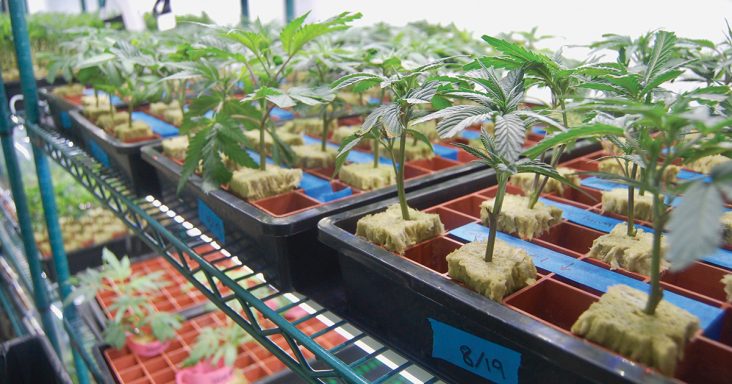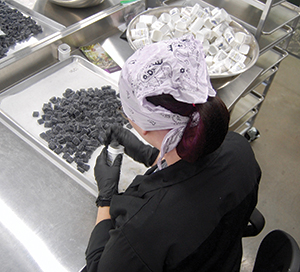Recreational marijuana use advocates say it could be a $1 billion industry
by September 15, 2022 12:56 pm 2,024 views

Marijuana pictured inside River Valley Relief in Fort Smith, one of the eight licensed marijuana cultivation sites in Arkansas.
River Valley Relief in Fort Smith could add up to 150 jobs. Kansas City, Kan.-based Greenlight estimates adding 100 jobs in Arkansas with $2 million in new investment. They’re just two of many medical marijuana companies operating in Arkansas likely to add jobs and investment if voters approve recreational marijuana use for adults in November.
Polling suggests broad support for recreational, or what is also called adult use.
But there will be opposition. Gov. Asa Hutchinson, a former federal prosecutor and head of the U.S. Drug Enforcement Administration under President George W. Bush, is against the November ballot question. He’s encouraging law enforcement groups to come out against the measure, telling members of the Arkansas Municipal Police Association not to be swayed by benefits being promoted by Responsible Growth Arkansas (RGA), the organization that worked to place legalization of recreational use on the November ballot.
“And so, once again, they’re selling a harmful drug to the citizens of Arkansas based upon promises that look good,” he said during the early August police association convention.
The Arkansas Family Council, a religious-based conservative lobbying group, has been vocal in opposition and is likely to be more active with messaging about what the group claims are numerous harmful individual and societal effects of marijuana use.
ARKANSAS, MISSOURI AMENDMENT
The RGA petition, approved in late July by Arkansas Secretary of State John Thurston to be placed on the Nov. 8 general election ballot, would amend the state’s existing medical marijuana law to allow those at least 21 to purchase cannabis from licensed dispensaries.
The 40 licensed medical marijuana dispensaries would be allowed to sell for adult use, and the number of authorized licensed dispensaries would grow to 120. Also, the permitted eight cultivation licenses would increase to 12. The proposal would also end the sales tax on medical marijuana and replace it with a sales tax of up to 10%, with some tax revenue set aside for an annual stipend for law enforcement officers. Tax revenue would also be directed to the University of Arkansas for Medical Sciences and drug court programs and the state’s general revenue.

There is a hitch with the Arkansas amendment. In early August, the Arkansas Board of Election Commissioners denied certifying the ballot issue based on concerns regarding background checks for dispensary owners and limits on tetrahydrocannabinol (THC) in marijuana. RGA appealed the ruling to the Arkansas Supreme Court, and Steve Lancaster, attorney for Wright Lindsey Jennings and RGA spokesman, has said he expects a Supreme Court decision in late September or early October.
Missouri voters will also have a say in November on adult use marijuana. The proposed amendment would legalize the possession and use of marijuana for those 21 and older and allow up to 3 ounces in a single purchase. Also, Missouri residents could grow no more than six mature marijuana plants at home.
‘MISSED OPPORTUNITY’
Storm Nolan is a partner with Fort Smith-based River Valley Relief, one of the eight licensed marijuana cultivation sites in Arkansas. He said if voters reject the amendment, it will be a “missed opportunity” for Arkansas to benefit from a more significant marijuana sales and cultivation economy.
He said conservative estimates have sales being three to four times more than those with just medical marijuana, which had $264.9 million in sales in 2021. Voter approval of adult use would put a full year of sales at around $1.06 billion, which could generate tax revenue of $106 million. Nolan believes sales could top $1 billion.
“That is money being produced and consumed in our own state, and that’s a healthy thing, keeping that money in the state. … If they [Oklahoma and Missouri] do it and we don’t, there will be a drain across the border,” he told the Northwest Arkansas Business Journal.
It would also drive growth for River Valley Relief, which has about 50 employees working in a 25,000-square-foot facility. The company has space to expand to 100,000 square feet, which Nolan said would require about 200 jobs to operate.
“That’s more of a three-year plan for that entire space. We’re going to take it expansion by expansion and see how the market reacts,” Nolan said, adding that the three-year plan includes “part of the hope” that voters in November approve the adult use amendment.
“Hope for the best. Prepare for the worst. We’re trying to be prepared for either scenario,” he said.
NOVEMBER HOPES
Hope is also what Greenlight CEO John Mueller has for November.

Greenlight is a vertically-integrated cannabis company in Kansas with 24 active dispensaries — four in Arkansas at Helena, Little Rock, Monticello and West Memphis — and nine dispensaries under construction. The company employs more than 400, with 50 of those in Arkansas. The company, which has operations in five states, also has more than 150,000 square feet of cultivation with around 135,000 square feet under construction.
“We’re optimistic on the November vote. Nationwide, if you look at the polling, which is similar to Arkansas, you have almost 60% approval rating (for adult use marijuana),” Mueller said. “I think there is shifting sentiment across the country. You’ve now got a 90% approval rating nationwide on medical marijuana. And, you know, they might not use it, but they believe other people should have access to it.”
According to a February Talk Business & Politics and Hendrix College survey, 53.5% of Arkansas voters support legalizing marijuana for adults.
He said voter approval of the amendment would likely result in Greenlight investing another $2 million in Arkansas and adding around 100 jobs to meet the new demand. And in addition to capturing what would be legal demand that would boost annual sales in Arkansas to around $1 billion a year, Mueller believes illegal sales could be redirected through licensed dispensaries.
“It’s about $800 million in [Arkansas’] black market that is not being taxed, regulated or tested. With the expansion of adult use, we can take a good chunk of that away,” he said.
SOCIAL JUSTICE ANGLE
Nolan and Mueller also believe legalizing adult use marijuana should come with efforts to create a responsible system to release those incarcerated for marijuana possession and expunge records of those with marijuana possession history.
“My one disappointment with Responsible Growth Arkansas, as written, is they did not include expungement. … And they didn’t do that because they thought it would open up the effort to undue legal risk. Mandating expungement through a ballot initiative is always legally tricky, especially what you can get in the title and what has to be in the body (of the ballot language). And so they chose the conservative route of not including expungement,” Nolan explained.
However, Nolan said backers of Responsible Growth Arkansas “have promised” they will pursue “a large effort” to work with the Arkansas Legislature on an expungement bill.
Mueller stopped short of pushing for a direct effort toward early release or expungement, saying instead that cannabis industry leaders should work with law enforcement and legislators to determine the best use of state resources. He suggested that many in law enforcement would rather deal with more serious problems in their respective communities than being responsible for laws that criminalize marijuana use and possession.
Editor’s note: Michael Tilley, the author of this story, explains more in the interview below.
